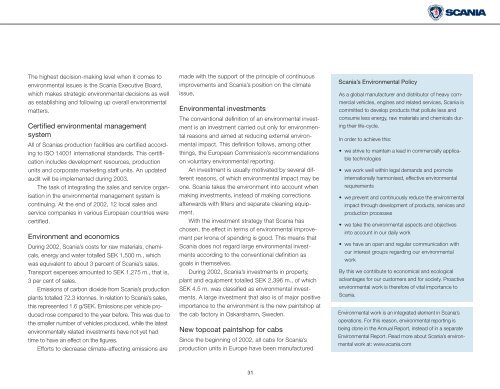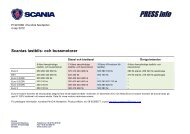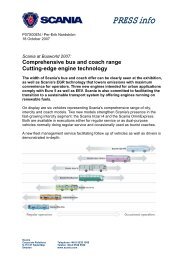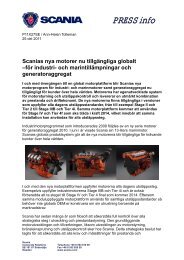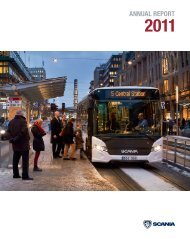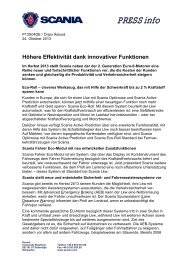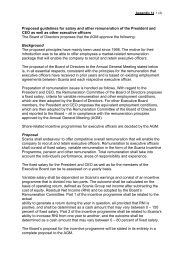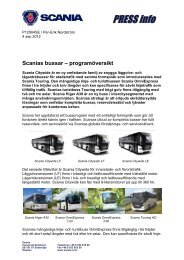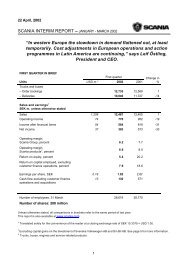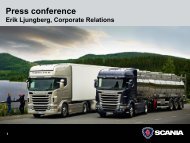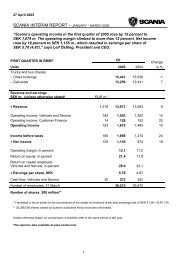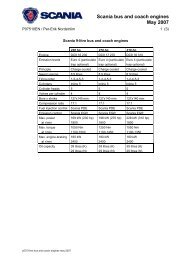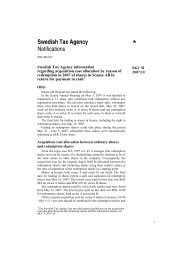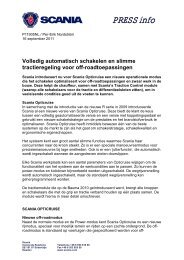Scania annual report 2002
Scania annual report 2002
Scania annual report 2002
Create successful ePaper yourself
Turn your PDF publications into a flip-book with our unique Google optimized e-Paper software.
The highest decision-making level when it comes to<br />
environmental issues is the <strong>Scania</strong> Executive Board,<br />
which makes strategic environmental decisions as well<br />
as establishing and following up overall environmental<br />
matters.<br />
Certified environmental management<br />
system<br />
All of <strong>Scania</strong>s production facilities are certified according<br />
to ISO 14001 international standards. This certification<br />
includes development resources, production<br />
units and corporate marketing staff units. An updated<br />
audit will be implemented during 2003.<br />
The task of integrating the sales and service organisation<br />
in the environmental management system is<br />
continuing. At the end of <strong>2002</strong>, 12 local sales and<br />
service companies in various European countries were<br />
certified.<br />
Environment and economics<br />
During <strong>2002</strong>, <strong>Scania</strong>’s costs for raw materials, chemicals,<br />
energy and water totalled SEK 1,500 m., which<br />
was equivalent to about 3 percent of <strong>Scania</strong>’s sales.<br />
Transport expenses amounted to SEK 1,275 m., that is,<br />
3 per cent of sales.<br />
Emissions of carbon dioxide from <strong>Scania</strong>’s production<br />
plants totalled 72.3 ktonnes. In relation to <strong>Scania</strong>’s sales,<br />
this represented 1.6 g/SEK. Emissions per vehicle produced<br />
rose compared to the year before. This was due to<br />
the smaller number of vehicles produced, while the latest<br />
environmentally related investments have not yet had<br />
time to have an effect on the figures.<br />
Efforts to decrease climate-affecting emissions are<br />
made with the support of the principle of continuous<br />
improvements and <strong>Scania</strong>’s position on the climate<br />
issue,<br />
Environmental investments<br />
The conventional definition of an environmental investment<br />
is an investment carried out only for environmental<br />
reasons and aimed at reducing external environmental<br />
impact. This definition follows, among other<br />
things, the European Commission’s recommendations<br />
on voluntary environmental <strong>report</strong>ing.<br />
An investment is usually motivated by several different<br />
reasons, of which environmental impact may be<br />
one. <strong>Scania</strong> takes the environment into account when<br />
making investments, instead of making corrections<br />
afterwards with filters and separate cleaning equipment.<br />
With the investment strategy that <strong>Scania</strong> has<br />
chosen, the effect in terms of environmental improvement<br />
per krona of spending is good. This means that<br />
<strong>Scania</strong> does not regard large environmental investments<br />
according to the conventional definition as<br />
goals in themselves.<br />
During <strong>2002</strong>, <strong>Scania</strong>’s investments in property,<br />
plant and equipment totalled SEK 2,396 m., of which<br />
SEK 4.5 m. was classified as environmental investments.<br />
A large investment that also is of major positive<br />
importance to the environment is the new paintshop at<br />
the cab factory in Oskarshamn, Sweden.<br />
New topcoat paintshop for cabs<br />
Since the beginning of <strong>2002</strong>, all cabs for <strong>Scania</strong>’s<br />
production units in Europe have been manufactured<br />
<strong>Scania</strong>’s Environmental Policy<br />
As a global manufacturer and distributor of heavy commercial<br />
vehicles, engines and related services, <strong>Scania</strong> is<br />
committed to develop products that pollute less and<br />
consume less energy, raw materials and chemicals during<br />
their life-cycle.<br />
In order to achieve this:<br />
• we strive to maintain a lead in commercially applicable<br />
technologies<br />
• we work well within legal demands and promote<br />
internationally harmonised, effective environmental<br />
requirements<br />
• we prevent and continuously reduce the environmental<br />
impact through development of products, services and<br />
production processes<br />
• we take the environmental aspects and objectives<br />
into account in our daily work<br />
• we have an open and regular communication with<br />
our interest groups regarding our environmental<br />
work<br />
By this we contribute to economical and ecological<br />
advantages for our customers and for society. Proactive<br />
environmental work is therefore of vital importance to<br />
<strong>Scania</strong>.<br />
Environmental work is an integrated element in <strong>Scania</strong>’s<br />
operations. For this reason, environmental <strong>report</strong>ing is<br />
being done in the Annual Report, instead of in a separate<br />
Environmental Report. Read more about <strong>Scania</strong>’s environmental<br />
work at: www.scania.com<br />
31


